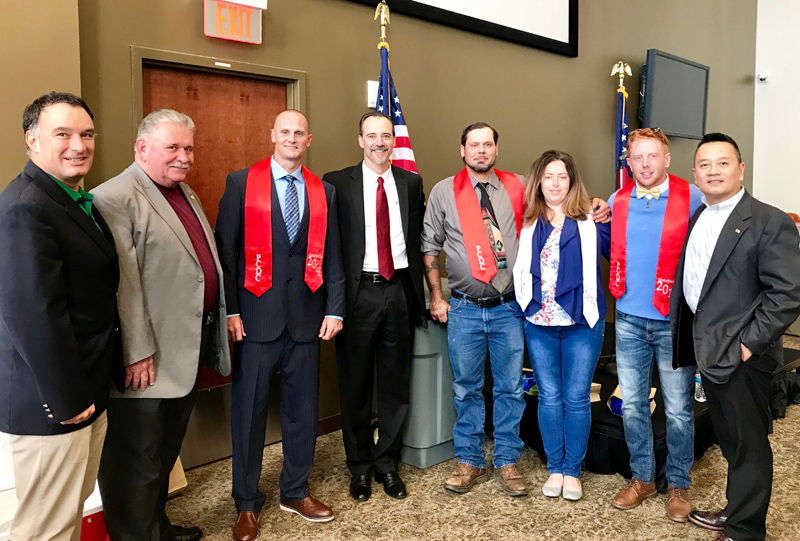Paulding Judicial Drug Court Program Hosts its Third Graduation Ceremony
On Friday, October 12, 2018, the Paulding Judicial Circuit Drug Court Program hosted its third graduation since it began in January 2016. There were four graduates, which brings the total number of Paulding Drug Court graduates to twelve.
Participants must remain in the Program for a minimum of 18 months, although most require approximately two years to graduate. After graduation, the participants must complete six months of aftercare.
The Drug Court Program represents a demanding and drastic lifestyle change for participants. New participants are drug tested several times a week. They must attend group therapy four days a week, attend individual and family therapy once a month, attend three 12-step classes a week, keep a curfew, maintain employment, pay a weekly program fee, begin studying for the GED (if the participant does not have a diploma), attend court every Friday, and more. Surveillance officers monitor the participants in the community to ensure compliance. The Court holds participants accountable by rewarding good conduct and by punishing rule violations.
The Program is run by a team that meets weekly to discuss each participant's progress and to consider others for admission. This team is headed up by Superior Court Judge Dean Bucci and Drug Court Coordinator Tracy Jacob. Other team members include therapist Demetrice Way-Watts, Assistant District Attorney Brett Williams, Assistant Public Defender Richard Hull, Deputy Sheriffs Clinton Barker, and Michelle Palmer, and Officer Ashley McClure of the Department of Community Supervision.
Each of the graduates, accompanied by friends and family, spoke at graduation about how their lives have changed since entering the Program. They have maintained their sobriety, re-connected with their families, and maintained employment. Some of the graduates obtained their GED while in the Program. One has paid off all of her sizable restitution payments from her criminal cases and has saved enough to make a down payment on a home. Another intends to begin college.
Drug Court programs are relatively new in Georgia. They are credited with rebuilding lives and significantly reducing crime. Approximately 75% of drug-involved offenders will be re-arrested within three years of release from confinement. However, that recidivism rate is much lower for drug court graduates. At the graduation ceremony, Judge Bucci compared the number of new criminal charges acquired by the twelve graduates in the two years immediately before they entered the Program with the number of new charges they incurred during the approximate two years since they entered the program. Those figures show a dramatic 97% reduction in new criminal charges.
Not everyone that enters Drug Court will complete the program, but those that do have a very bright future. The Drug Court Team is extremely proud of its graduates and wishes to congratulate each of them for their hard work. As one of the graduates said at the ceremony when asked about his future, “The sky is the limit.”










 Chief Magistrate Judge Martin E. Valbuena, Hiram City Councilman Frank Moran, Superior Court Judge Dean C. Bucci, and Drug Court Executive Committee member Dr. Edward Pham appear with the newest four graduates of the Paulding Judicial Circuit Drug Court Program, who are shown wearing their graduation sashes.
Chief Magistrate Judge Martin E. Valbuena, Hiram City Councilman Frank Moran, Superior Court Judge Dean C. Bucci, and Drug Court Executive Committee member Dr. Edward Pham appear with the newest four graduates of the Paulding Judicial Circuit Drug Court Program, who are shown wearing their graduation sashes.









